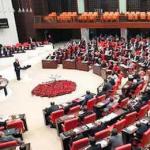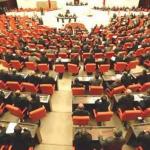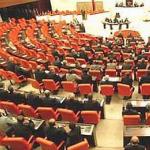The government's Constitutional Reform Package has passed through the Constitutional Commission in Parliament. The opposition Republican People's Party (CHP) requested to have each amendment approved in a public referendum. However, the ruling Justice and Development Party (AKP) rejected a public referendum over all.
This is the first part of a summary of the amendments as they have been passed by the Commission:
Article 10: Equality before the Law. The current second paragraph of the article reading "Men and women have equal rights. The State shall have the obligation to ensure that this equality exists in practice" is to be supplemented as follows: "According measures may not be interpreted as contrary to the principle of equality. Measures taken in regard to children, elderly or disabled people, widowed spouses and orphans of people who died in war or on duty and incapacitated people and veterans are not accounted for as contrary to the principle of equality".
Article 20: The following supplement will be added to article 20 on "Privacy on Individual Life": "Everybody has the right to have their personal data protected. This includes the right on information about one's own personal data, access to this data, the request to alter or erase data and to learn whether the data was used according to its purpose. Personal data may only be processed according to the law or with the person's consent".
Article 23: Freedom of Residence and Movement. The article shall be amended as follows: "A citizen's freedom to leave the country may be restricted on account of criminal investigation or prosecution and a judicial decision".
Article 41: The title of article 41 on "Protection of the Family" shall be changed to "Protection of the Family and Children's Rights". According to the draft law, the article will be complemented by the following provision:
"Every child has the right to protection and care and to establish and maintain a personal and direct relationship with her/his mother and father, unless this is clearly against the benefit of the child. The state shall take the necessary measures to protect children against all sorts of child abuse".
Labour Union Rights
Article 51: The last paragraph of article 51 on the "Right to Organize Labour Unions" shall be lifted. This enables a person of membership in more than one labour union at the same time.
Article 53: The amendment of article 53 on the "Right of Collective Bargaining" shall grant the right of collective bargaining to civil servants and other public officials. The parties can apply to the Public Service Board in case of conflicts. The board's decisions will be binding and equivalent to collective bargaining. This way, the outcome of collective bargaining becomes relevant for retired workers as well.
Article 54: Article 54 on the "Right to Strike and Lockout" will no longer hold labour unions liable for any material damage caused in a work-place where the strike is being held, as a result of deliberately negligent behaviour by the workers and the labour union. Politically motivated strikes and lockouts, solidarity strikes and lockouts, occupation of work premises, labour go-slows, and other forms of obstruction shall not be prohibited any more due to the draft bill.
Closure of political parties
Article 69: Principles to be Observed by Political Parties. Financial auditing of political parties shall be done by the Court of Auditors.
The dissolution of political parties shall be decided finally by the Constitutional Court after the filing of a suit by the office of the Chief Public Prosecutor of the Republic (TBMM). A commission shall be established consisting of five members of each party represented in the Turkish Grand National Assembly. This commission has to approve the law suit by a secret majority vote of two thirds. The commission will be lead by the TBMM President who will not be entitled to vote.
The decisions of the commission will be independent of the judiciary. The commission shall be established within 30 days of the request for permission to dissolve a party and the decision of the commission shall be issued within 60 days after the request of permission has been submitted to the Parliament. The group of representatives of the political parties in the parliament is not entitled to discuss the permission request or to decide on it.
In this context, the Constitutional Court may decide for a partial or full deprivation from of subsidies according to the severity of actions as subject of the case instead of dissolving the party. The deprivation from subsidies shall be subject to the closure case and the decision and does not constitute a case on its own.
Article 74: The "Right of Petition". A "Public Auditorship" (ombudsman) institution is to be created.
The institution will be established under the TBMM Presidency and shall investigate complaints regarding the functioning of the administration. The public chief auditor shall be elected by the TBMM in a secret vote for the duration of four years.
Article 84: The last paragraph of article 84 on "Loss of Membership of the Parliament" will be lifted. The application for the loss of membership of the parliament shall be abrogated.
Article 94: Bureau of the Assembly. The amendment refers to the duration of second term due to the shortening of the election period from five to four years. Accordingly, the Bureau of the Assembly shall perform its duty until the end of the second term.
Article 125: Recourse to Judicial Review. Appeals can be lodged against all kinds of partial decisions, except promotion procedures and retirement of temporary staff of the Supreme Military Council.
Judiciary will be restricted by the control of administrative actions and procedures according to the law. It shall not be used as a means of legitimate auditing.
Article 128: General Principles. The provision regulating the work of public servants shall grant the "right to collective bargaining" for civil servants.
Article 129: Duties and Responsibilities, and Guarantees during Disciplinary Proceedings. The article regulates the disciplinary prosecution of public servants and other public employees. Disciplinary decisions shall be subject to judicial review, including warnings and reprimands.
Article 144: Supervision of Judges and Public Prosecutors. Supervision of services of the judiciary and administrative duties of public prosecutors shall be made by the Ministry of Justice. Inquiries and investigations are to be conducted by the judiciary inspectors.
Military Justice
Article 145: Military Justice. The jurisdiction of military courts will be redefined. According to the draft bill, the military justice shall be exercised by military courts and discipline court. Military courts shall have jurisdiction to try cases of military personnel for military offences, for offences committed by them against other military personnel, or for offences connected with military service and duties.
Civilians shall not be tried at military courts except in state of war.


















